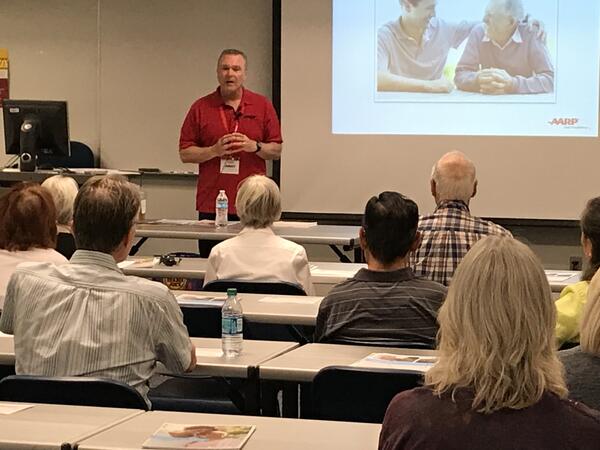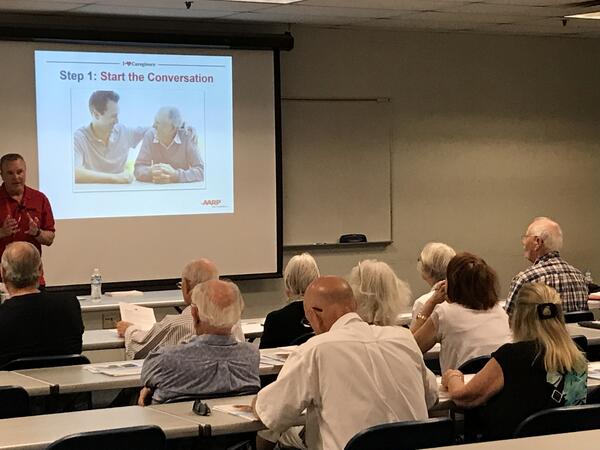
Event report
April 2018 - Caregivers Seminar
The final seminar of the 2017-2018 FY was well attended. Jerry Waterworth, AARP Community Volunteer, encouraged audience participation as he shared valuable information on “Preparing to Care: A Planning Guide for Families.” There are 4 kinds of people: 1) those who have been caregivers, 2) those who are currently caregivers, 3) those who will be caregivers, and 4) those who need caregivers. Essential to have in place before a caregiver is needed is a thorough, well thought-out caregivers plan. There are 5 steps to consider when preparing the plan:
- Start a conversation.
- Look for an opening, find a current event or ask a question to get the conversation moving. Don’t make the person feel defensive; it may take more than one try to get a conversation going.
- Respect your loved one’s wishes. A plan should never be made without the participation, knowledge and consent of your loved one.
- Size up the situation. Figuring out what your loved one’s priorities are – where they want to live and the nature of the care needed – will help determine the next steps.
- Review finances. Money can be a particularly sensitive subject, but it’s often at the heart of many decisions you’ll make with your loved one about housing, health care, and other expenses.
- Counter resistance.
- Form your team.
- Look for team members. Team members may live nearby or not, may be family or friends.
- Build and support your team. Putting a supportive team together that is deep and wide can strengthen both your and your loved one’s ability to deal with any issues that emerge.
- Make a plan.
- The most effective family caregiving plans are made with the person you are caring for at the center of the discussion.
- Be sure to ask your caregiving team members about their preferences for who does what task.
- The plan should include immediate needs as well as for the future.
- Set up a system for communicating with everyone on the team.
- Be open to modifications as the situation and team members’ ability to help may change.
- Find support.
- Locate community resources. Your local Area Agency on Aging is a great resource to connect you with various services.
- Consult a professional. This would include a doctor, nurse or social worker.
- Hire help. Visit the AARP Caregiving Resource Center at www.aarp.org/caregiving for more information on how to hire and find help.
- Secure safety. The main goal is to help your loved one stay as independent as possible and in their own home. Some simple changes to make a home safer are handrails, grab bars, night-lights, and adjustable shower seats. The AARP Home Fit Guide at www.aarp.org/homefit offers solutions than range from simple fixes to improvements that require skilled expertise.
- Care for yourself.
- Caregiving at a distance. Social workers, nurses and other professionals can guide you through care choices and help monitor the care when you don’t live nearby. Technology can also help. Keep a list of all contact information for doctors, insurance companies, and neighbors. It is also important to keep a list of your loved one's medications with you.
- Work and caregiving. If you still work, find out if your company has policies or programs to support caregivers. Check into flex time or working from home options to free up time. Consider asking about the Family and Medical Leave Act, if necessary.
- Understand the financial impact.Your budget can take a hit when caregiving. Try to calculate these costs when budgeting.
- Advocate for you. Make sure that the proper legal documentation is done (i.e. Durable Power of Attorney for Health Care) and the appropriate medical providers have a copy.
- Recognize your emotions.
- Take care of yourself. Allow yourself to take a break. Tend to your own needs for exercise, sleep and healthy eating.
- Caregiving services and support groups. There’s comfort in knowing others are experiencing the same ups and downs as you. It may also give you ideas about other strategies and resources available to lighten your load.
The information for this article was taken extensively from the AARP Prepare to Care booklet that can be found at https://www.aarp.org/caregiving/. Additionally, this website contains a wealth of information on caregiving basics, care at home, health (navigating physical and emotional health issues, insurance, doctors visits, and more), financial and legal information, caregiver life balance, and MORE. When you visit this site, also be sure to find and download the Phoenix Metro Caregiver Resource Guide.
Story and pictures submitted by Bev Buddee

Jerry Waterworth - AARP Community Volunteer

The seminar begins - start a conversation